PROPERTIES OF PARALLELOGRAM
Subscribe to our ▶️ YouTube channel 🔴 for the latest videos, updates, and tips.
A parallelogram is a quadrilateral with both pairs of opposite sides parallel. When we mark diagrams of quadrilaterals, use matching arrowheads to indicate which sides are parallel.
For example, in the diagram shown below,
AB || CD
AD || BC
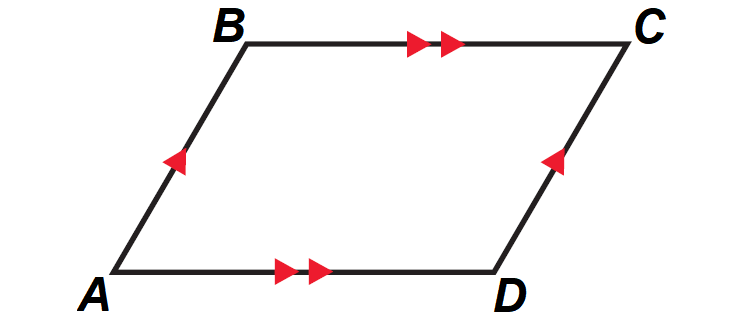
Properties of Parallelogram
Property 1 :
If a quadrilateral is a parallelogram, then its opposite sides are congruent.
It has been illustrated in the diagram shown below.
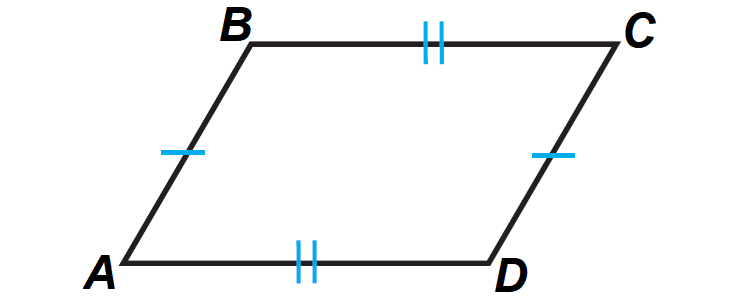
In the diagram above,
AB ≅ DC
AD ≅ BC
Property 2 :
If a quadrilateral is a parallelogram, then its opposite angles are congruent.
It has been illustrated in the diagram shown below.
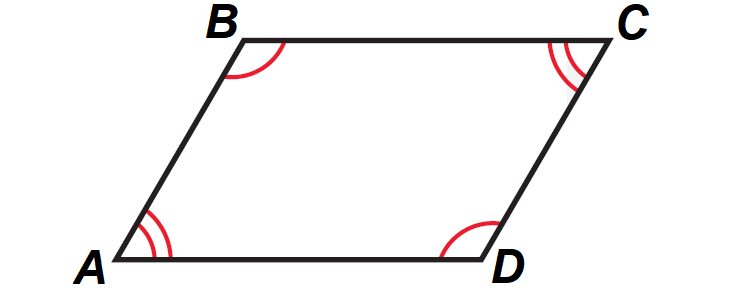
In the diagram above,
m∠A ≅ m∠C
m∠B ≅ m∠D
Property 3 :
If a quadrilateral is a parallelogram, then its consecutive angles are supplementary.
It has been illustrated in the diagram shown below.
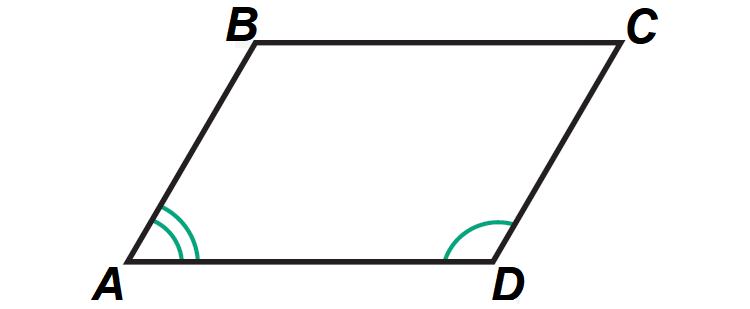
In the diagram above,
m∠A + m∠B = 180°
m∠B + m∠C = 180°
m∠C + m∠D = 180°
m∠A + m∠D = 180°
Property 4 :
If a quadrilateral is a parallelogram, then its diagonals bisect each other.
It has been illustrated in the diagram shown below.
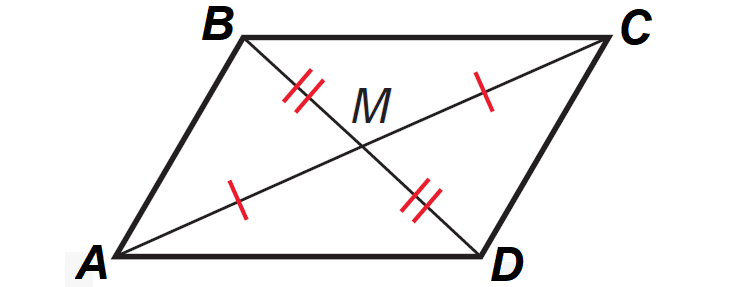
In the diagram above,
AM ≅ CM
BM ≅ DM
Solving Problems Using Properties of Parallelogram
Problem 1 :
Find the lengths of SR and SK in the parallelogram shown below. Explain your reasoning.
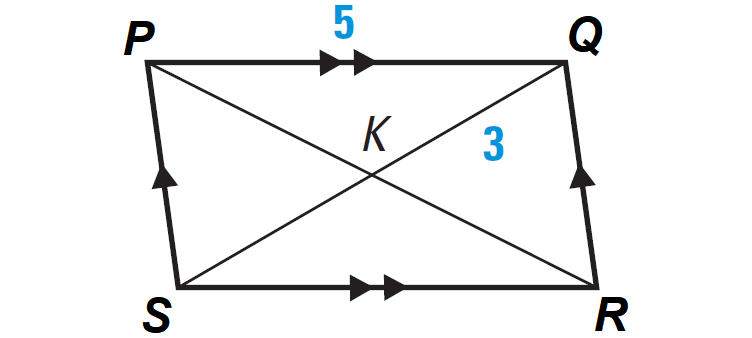
Solution :
Finding the length of SR :
By Theorem, opposite sides of a parallelogram are congruent.
So, we have
SR = PQ
From the diagram, PQ = 5.
SR = 5
Finding the length of SK :
By Theorem, diagonals of a parallelogram bisect each other.
So, we have
SK = QK
From the diagram, QK = 3.
SK = 3
Problem 2 :
Find the measures of ∠C and ∠B in the parallelogram ABCD.
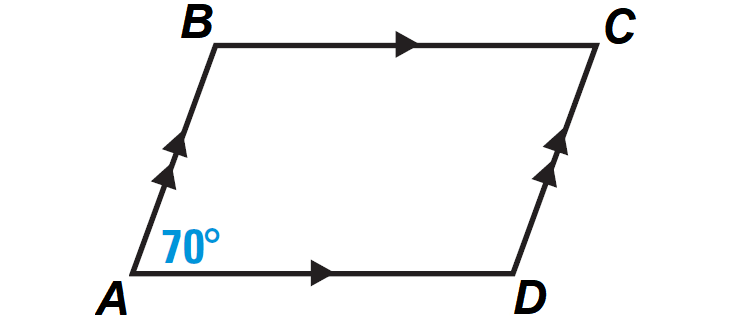
Solution :
Finding the measure of ∠C :
By Theorem, opposite angles of a parallelogram are congruent.
So, we have
m∠C = m∠A
From the diagram, m∠A = 70°.
m∠C = 70°
Finding the measure of ∠B :
By Theorem, consecutive angles of a parallelogram are supplementary.
So, we have
m∠A + m∠B = 180°
From the diagram, m∠A = 70°.
70° + m∠B = 180°
Subtract 70° from both sides.
m∠B = 110°
Problem 3 :
Find the value of x in the parallelogram ABCD shown below.
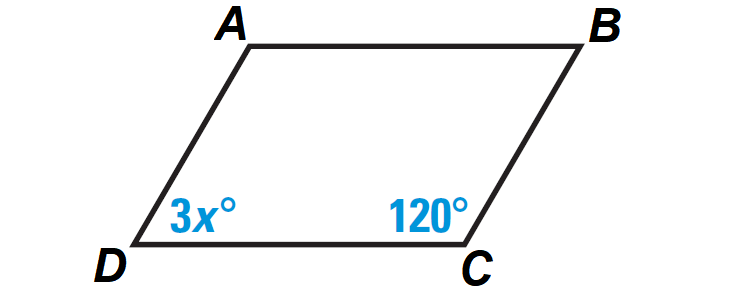
Solution :
By Theorem, consecutive angles of a parallelogram are supplementary.
So, we have
m∠D + m∠C = 180°
Substitute m∠D = 3x° and m∠C = 120°.
3x° + 120° = 180°
Subtract 120° from both sides.
3x° = 60°
3x = 60
Divide both sides by 3.
x = 20
Problem 4 :
In the diagram shown below, ABCD and AEFG are parallelograms. Prove that m∠1 ≅ m∠3.
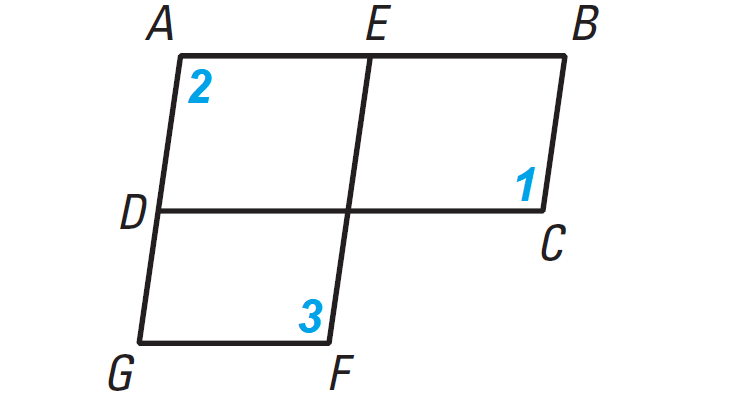
Solution :
Plan : Show that both angles are congruent to m∠2. Then use the Transitive Property of Congruence.
|
Statements ABCD is a parallelogram AEFG is a parallelogram aaaaa m∠1 ≅ m∠2 aaa aaaaa m∠2 ≅ m∠3 aaa m∠1 ≅ m∠2 |
Reasons aaaaaaa Given aaaaaaa aaaaaaaaaaaaaaaaaaaaaaa Opposite angles of a parallelogram are congruent. Transitive property of congruence. |
Problem 5 :
In the parallelogram ABCD shown below, prove that WX ≅ YZ and WZ ≅ XY.
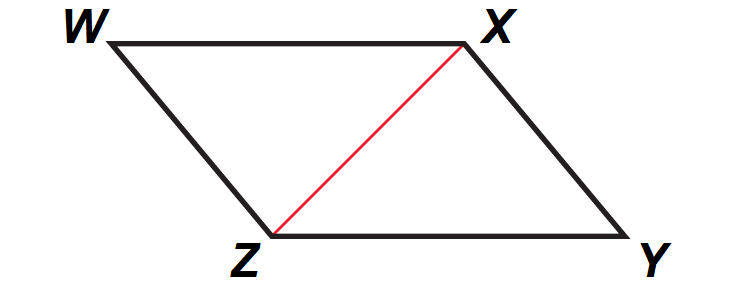
Solution :
|
Statements aaaaaa WXYZ is a aaaaa aaaa parallelogram aaaa aaaaaa Draw XZ aaaaaa aaaaaaaaaaaaaaaaaaaaa aaaaaaaaaaaaaaaaaaaaa WX || YZ, WZ || XY aa m∠WXZ ≅ m∠YZX a aa m∠WZX ≅ m∠YXZ aaaaaa ZX ≅ ZX aaaaa aaaaaaaaaaaaaaaaaaaaa ΔWZX ≅ ΔYXZ WX ≅ YZ, WZ ≅ XY |
Reasons aaaaaaaaaa Given aaaaaaaaa aaaaaaaaaaaaaaaaaaaaaaaa aaThrough any two points there exists exactly one a aaaaaaaaa line. Definition of parallelogram Alternate Interior Angles Theorem Reflexive Property of Congruence ASA Congruence Postulate Corresponding parts of congruent triangles are congruent |
Subscribe to our ▶️ YouTube channel 🔴 for the latest videos, updates, and tips.
Kindly mail your feedback to v4formath@gmail.com
We always appreciate your feedback.
About Us | Contact Us | Privacy Policy
©All rights reserved. onlinemath4all.com

Recent Articles
-
How to Master the SAT Math Section
Feb 13, 26 02:52 AM
How to Master the SAT Math Section -
How to Solve the Hardest SAT Math Problems
Feb 13, 26 02:24 AM
How to Solve the Hardest SAT Math Problems -
Mastering the SAT Math
Feb 12, 26 07:16 AM
Mastering the SAT Math


